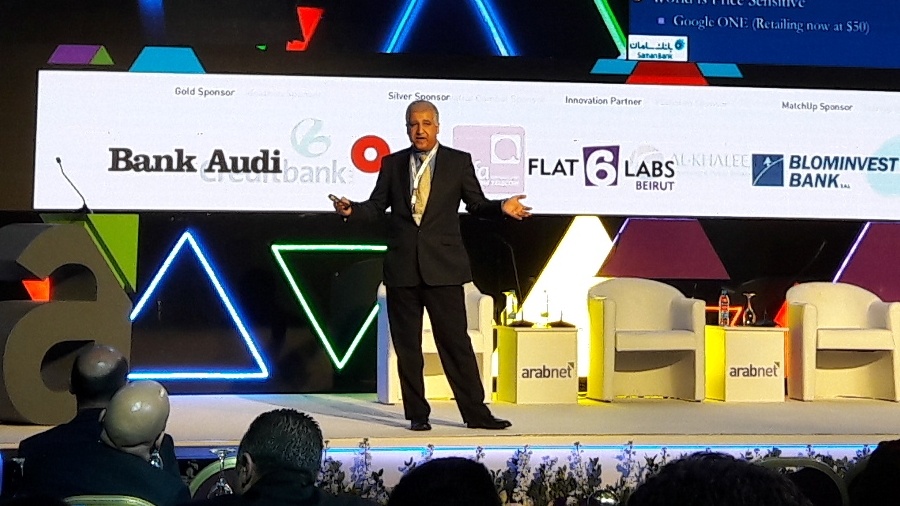Big deals announced at Arabnet Beirut

At Arabnet Beirut this week Flat6labs, a regional incubator, announced that it was accepting applications for a $20 million local fund.
The Lebanon Seed Fund will support 100 Lebanese startups in the next five years.
“The Lebanese ecosystem is growing exponentially and is one of the fastest growing in the region. And with this fund, Flat6Labs wants to partner with many Lebanese startups,” said Flat6Labs CEO Ramez El-Serafy.
The incubator began in Cairo before expanding to Abu Dhabi, Jeddah, Tunisia and Beirut. It is one of the oldest accelerators in the region and has graduated successful startups such as Instabug, Nafham and Integreight.
In addition, the UK Lebanon Tech Hub announced their own $3.1 million fund.
The money would be used to build a global research center in Beirut that would “increase cooperation between Lebanese universities, the tech sector and British universities”, said UK ambassador Hugo Shorter during a press conference.

new funding for the UKLTH. (Image via Arabnet)
Ayman Kayssi, dean of the engineering department at the American University of Beirut, announced a cooperation with Beirut Digital District (BDD) called Innovate@FE.
The program aimed to “fill the gap between academia and entrepreneurship”, said Kayssi.
Between 30 to 40 students will receive training at the BDD and participate in BDD events and workshops.
Arabnet founder Omar Christidis told Wamda the digital economy in Lebanon would witness “big steps in the near future that will be announced by the new strategies of the country’s top level officials”, without disclosing any further details.
The future belongs to the youth
Samih Jaber from Kalimat, an education NGO that organizes robotics and electronics workshops in Beirut, was happy with the increasing popularity of entrepreneurship.
“We are receiving a lot of applications that have led us to organize several workshops in different areas across Lebanon, not only in Beirut,” he said.
Christidis said at future Arabnet events university students and high school pupils would be offered workshops. “Entrepreneurship should be encouraged at a young age,” he said.
More promises of better Internet
At Arabnet Raed Charafeddine, the first vice governor of Lebanon’s central bank, said there were 800 startups in Lebanon providing 6,000 job opportunities, injecting around $1 billion into the the country’s economy. The knowledge economy in Lebanon was also growing by 7 to 9 percent yearly, he added.
However, the digital economy requires fast Internet services, unlike that of Lebanon’s.
But Imad Kreidieh, president of Lebanon’s state-owned telco Ogero, internet speeds are due to become two to three times faster, with more capacity.
Kreidieh also promised 4G mobile internet covering 85 percent of Lebanon by the end of March.

Go digital or go home
The banking sector, the backbone of the Lebanese economy, is also moving online. A recent Arabnet study found that 50 percent of bank customers used digital banking services.
But in online payments Lebanon falls short of its regional counterparts. One indicator of success in that area is ecommerce, and Lebanon saw only 0.55 percent ecommerce market growth in 2014 and 0.78 percent in 2015.
Lebanese banks are still focusing on increasing the number of branches in different areas (there were 1,060 branches in total in 2016), instead of developing their apps and online services.
“If banks do not provide services for this age, they will fail and become an extinct dinosaur. Especially with companies such as Google and Facebook that are looking to become the banks of the future,” said Farshad Nowshadi, VP of Saman Bank.

Smart funding and mentorship
Nowshadi reminded his audience during a panel on fintech that 70 to 80 percent of startups in the US and the UK fail, and it wouldn’t be different in this region. He advised entrepreneurs to conduct market research before launching any project to identify the opportunities and the challenges.
In addition to research, Ahmad Tuffaha of the recently launched Phoenician Fund said Lebanon needed to educate and train entrepreneurs.
“What we need is smart funding, research and allowing startups to go public,” he said.
Bur for entrepreneur Hussein Sleiman, founder of early stage healthtech startup Find a Nurse, funding is not his priority. What he needs now is mentorship and advice.
“The abundance of funding helps startups. However, it increases competition as well,” he said.
Feature image via Arabnet.


